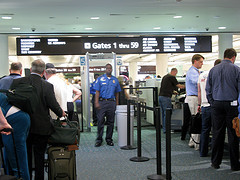Airport Security Lines Are Long Because You Don’t Feel Like Stacking Your Bin After Screening
Look! On the horizon! There’s something clogging up the airport security lane. Is it a screaming toddler? Is it the guy who always forgets to take his belt off? No, it’s… a bunch of bins backing up the conveyor belt because there aren’t enough workers to remove them.
We’ve all been guilty of not picking up our own bins after we’ve emptied them of personal belongings on the happy end of airport security checkpoints, sure. We’ve been through enough already in the security experience, right?
But combine that with the fact that there aren’t enough Transportation Administration workers to whisk the bins into orderly stacks before they head back to the other side and you’ve got the potential for some whopper logjams.
This simple phenomenon is why airport security lines are so long, claims Conde Nast Traveler’s Barbara Peterson.
Peterson witnessed bin gridlock firsthand at Dulles Airport while working as a volunteer bin pusher. She reports that it often got so bad, the TSA would pull non-screener staff from desk jobs to become bin shufflings and try to cut down on line congestion.
We’re also become a population of travelers hauling around a lot more than we used to — because of fees for checked bags, fliers often prefer to only carry on, which means everything needs to be screened. That means separate bins for things like laptops and those ubiquitous plastic bags for toiletries. More bins!
So if you want to move things quickly please, let’s all try to do ourselves a favor if you’re able: Pick up your bin when you’re done with it, and stack it so we can all go about our business. Heck, maybe if people weren’t so grumpy about standing in a slow line caused by bin cloggage, we might feel nice enough to pick up our bins in the first place. It could be a delightful circle.
Why it takes so long to get through airport security [Traveler]
Want more consumer news? Visit our parent organization, Consumer Reports, for the latest on scams, recalls, and other consumer issues.


